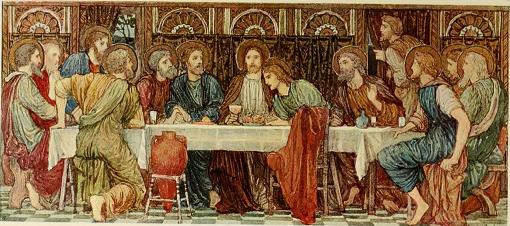Last night as I was in the midst of taking care of medical
needs that my daughter requires, I had a brief moment to reflect over the past
few days. It’s been one of those those times where it just seems like
everything is either wrong or bad or crazy. A time when you realize that there
are no good choices, only less-bad choices. Things that happen beyond our
control that affects us nonetheless. Things seemingly within our control that
inexplicably and frustratingly slip from our grasp. Had I the ability, in that
moment, to wave a magic wand and make things right I would have. In only a few
moments of reflecting on the hard things and the bad things and the crazy
things, I was immediately assaulted with the question, Why? Why God does my
daughter’s body not work and we have to go through this crap every day? Why are
there things and people outside of my control that rain down hatred and crazy
on my life and the life of my family? Why can’t I just, for once, not be
mindlessly calloused when my wife is in need of care and comfort? Why does
everything have to be so hard?
It was a brief moment. I really didn't even think through
that much detail. It all just kind of hit me at once all blended in together,
just an overwhelming feeling of “Why?” And almost as soon as I had mentally
voiced my complaint to God I received an answer. The answer was, “Because of
the curse.” The answer was just so plain and obvious and so satisfying. Within
half a second my entire disposition was readjusted. Why is the sin of others
affecting me and my family? Because of the curse. Why does sin so pervade within
me that I don’t realize I've sinned until the damage is already done? Because
of the curse. Why does my daughter have this disability? Because of the curse.
Why are plans and people so easily frustrated? Because of the curse. Why does everything
just have to be so hard? Because of the curse.
The puzzle pieces fit and I could make sense of things
again. A feeling of relief came over me. The question ‘Why?’ didn't have the
overwhelming force and influence over my soul that it once grasped. I realized I
my complaint, which felt justified at the moment I said it, was on unsettled
ground. Unbelief crept in, disguised as self-pity. The answer I received, “Because
of the curse”, gave me solid ground to stand on. I can battle my unbelief from
this position.
And then I realized that I had actually heard a voice. The
answer “Because of the curse” didn't arise within my soul like an echo from the
Holy Spirit, it was literally audible to my ears. I heard it. Writing all of this out now as a step by step process really
gives a false impression. All of this—the thoughts, the complaint, the answer,
the satisfaction, the readjustment, the strange realization of an audible voice
answering the inaudible question of my soul—took place in nearly an instant.
The audible voice I heard did not come from a burning bush.
There wasn't an angel dressed in white seated before me. The heavens didn't
open. No thunder from the sky. It came from the other room. It wasn't my wife
or kids. It was the TV. The kids were watching a show. I sat and listened for a
moment. What were they watching? After a few seconds I realized it was
Scooby-Doo. Someone had said, “Because of the curse” in reference to some
mystery that needed solved. It hit me. Did my soul just receive a satisfying
cleanse from a goofy cartoon show about some stoner kid detectives and their
dog? Zoinks. They say that God moves in mysterious ways. Apparently He also
moves in hilarious ways.
I’m not going to frame this as, “God spoke to me through
Scooby-Doo,” even though I might. I certainly believe in the providence of God.
I have no qualms believing He is able to answer prayer with a dose of truth, no
matter the source of that truth. I don’t believe that God embodied the TV in
some supernatural way and spoke through a cartoon character. But I do believe
that all truth points to God whether it means to or not. If God so ordained it
that Scooby-Doo would be the instrument of answered prayer than who am I to
scoff? Just as John Newton believed every interruption was from the Lord, I’ll
take it that this perfectly timed line from a cartoon was an act of the providence
of God. I cannot deny that in those moments God was at work in my soul, freeing
me from fear and unbelief and strengthening me with truth.
I said that apparently God moves in hilarious ways. And why
not? Our common idea of God is that He is not funny. He’s grim and somber and
looks down on those who laugh. It’s a topic we’re uncomfortable with. For many
it seems sacrilegious to claim that God has a sense of humor. I've never seen a
conference on The Humor of God. But humor and laughter are good things, holy
things. And like all good things and all holy things, they can be abused. Laughter
strengthens and emboldens, which is why there are warnings against cruel humor.
God does not want us to be strengthened and emboldened in evil things. But the
abuse of laughter does not mean we should abolish laughter. Humor is holy
because it is from God. Because we desecrate holy things doesn't mean that it originated
from the devil. Perversion is from the devil. Humor is from God. Perverted
humor is a desecration of a holy thing.
God is an expert at making the wise foolish and the foolish
wise. How can humor not be an instrument in bringing this about? It is a holy
making-fun-of. Using the foolish things of this world to shame those who are
wise in this world is a righteous punchline. He made a donkey speak to and
scold a prophet. He made Balaam the bigger of the two jackasses. How can the
inventor of time not also be the inventor of comedic timing?
I get the feeling the reason we don’t like to think of God
as humorous is because it is too terrifying. The God with the grim furrowed
brows has the weight of the world on his shoulders. He is concerned for His
Creation in the same way we are concerned over our finances. The God who Laughs
has nothing to worry about. He’s carefree. The God who giggles, snickers, chortles,
and guffaws exposes our precarious state. We want a God who is distraught over
our situation because it validates our worth in our own eyes. We have convinced ourselves that if God worries
about what I worry about then that means God cares about me. But what happens if
I’m worrying about my sin and bills and pain and ridicule and disease and death
and God is laughing!? We get the
impression that God doesn’t care.
Jesus and his disciples were on the sea and a major storm
blew in. The boat was being swamped by the waves. The disciples were freaking
out. They thought they were going to die. They turned to find Jesus and Jesus
was…sleeping!? Are you kidding me? Hey Jesus, wake up and do something about
this! Don’t you care that we are about to drown here? Mark tells us that they
literally said, “Do you not care that we are perishing?” They didn't see Jesus
fretting like they were and it really bothered them. Jesus sleeping in the boat
shook their souls harder than the waves shook the boat. Their panic stricken
plea to Jesus revealed exactly where their faith resided. They wanted similar
panic from their Lord to validate their fear, which is tied to their worth. He
doesn't care about us enough to even wake up and worry like we are worrying! When
they woke Jesus up, he rebuked the wind and waves, but also his disciples. “Why
are you afraid, O you of little faith?”
This is why we are so unnerved at the thought of the God who
Laughs. This is why it is hard for us to understand that humor is holy and
sanctioned by God. Our faith is exposed and is found wanting. Jesus asked the
disciples “why are you afraid?” not because He was unable to conceive why the experience
of nearly drowning might be frightening, but he asked to expose their faith. He
is telling them, “My sleeping in the midst of a storm ought to be a comfort to
you.” Jesus sleeping in the midst of the
storm didn't give them peace. They didn't find rest in the Creator’s resting.
In the same way, if God is laughing in the midst of our chaos and we react in
rage or we become irritated, we are exposing our own lack of faith. God
laughing in the middle of your storm, your pain, your hardship isn't a sign of
unconcern or malice. He’s not laughing at you, He’s laughing for you. Rest in His laughter. Find
strength in His humor. Hope is beaming from the upturned corners of his lips.
What if one of the distraught disciples turned to see Jesus sleeping and in
faith found the strength and hope to just lay down next to him? Just as Jesus’
sleeping should have comforted the disciples, the humor of God should comfort
you. Your pain and your struggles and your hardship are nothing compared to the
hope we have of eternal glory in the presence of God.
As I thought about it, the fact that God provided great
strength and assurance and guidance and truth in response to my prayer at just
the right moment in a line from Scooby-Doo, I couldn't help but release a
breath of laughter through my nose. Contemplating the humor of God in this
situation gave me greater faith and hope and a deeper realization that God’s
humor and laughter indicates that He has triumphed over the curse. God laughs because
the world will one day be remade, because the curse will one day be fully
broken, because all my sin will be cleansed, because justice will not be overlooked,
because all pain and struggle and hardship will pass away, and because my
daughter’s body will one day be made whole.






